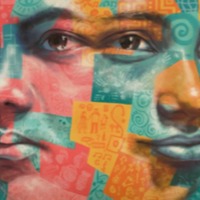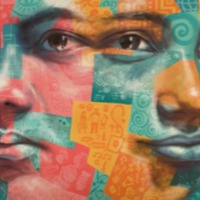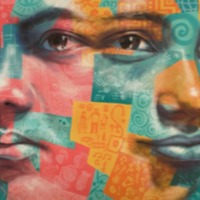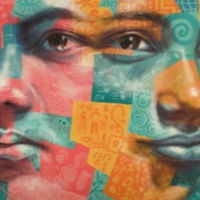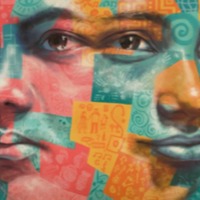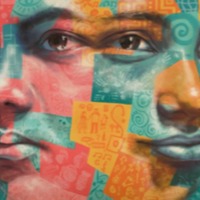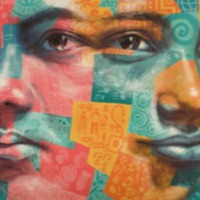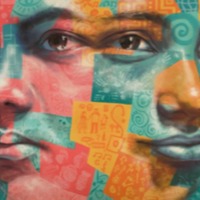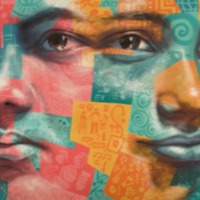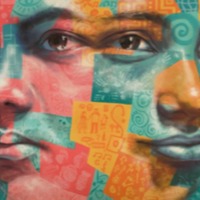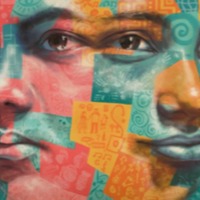
I approach the petrol pump and see a tall, confident young woman directing traffic. “Come again,” she says to a customer as he drives away. Dignified and independent, she lives the life I dreamt for her. Our eyes meet and this business woman becomes my child. I extend my arms to pull her in close. “I am so proud of you,” I whisper, as I remember all the times I resisted the pimps who tried to prostitute her.
I was born in a small village in Jessore, Bangladesh. My father was a simple farmer. We were poor, but all of my eight brothers and sisters went to school. I was known in my village as the girl with the golden voice. Growing up, my songs were about the earth, the sky, and my village. But when I met the man I wanted to marry, my songs changed to my love for him. He was twice my age. We would sit together for hours as he told me tales of his far-away travels to big cities. I was impressed by everything about him—his bicycle, his radio, his clothes. When I turned 13, he told me he wanted to marry me, and that he could make me into a famous singer one day. I agreed. It is very common for girls to marry early in rural India and Bangladesh. Since women are valued mostly as homemakers and mothers, families have no incentive to keep their daughters in school. The older a girl gets, the more her family will have to pay for her dowry. For these reasons, many of my friends were already married when the question was posed to me.
My heart beat fast as we crossed the border in the darkness of night. I had never been to a big city like Kolkata, and so I was distracted from the reality that I was leaving my family and my school. I was terrified of being caught, but thrilled at the prospect of settling down with the man I loved.
When we arrived, he told me he wanted to keep me safe with his aunt until my parents stopped looking for us. In a few days, he would return for me. I was reluctant to see him go, but I trusted his decision. That night, in the glow of moonlight, I saw girls in short skirts and red lipstick standing in a line on the street. When a man approached one of them, she led him into her house. The next morning, I asked his aunt about these girls. She spoke to me in a hollow voice devoid of emotion. I was told that I had been sold to her by the man I loved, and that I would have to work off my debt by joining those girls each night.
I still remember that moment when my whole world shattered into pieces. I’ve been tortured and abused, and survived serious injuries inflicted by buyers and pimps, but nothing hurts as much as the pain of being deceived by the man I loved.
For a whole month, I resisted the ‘aunt,’ who I learned was really a brothel madam. The owner of the brothel grew impatient and raped me, as he did to all new girls. He ordered the brothel madam to beat me with a leather belt every day. I still bear these marks on my body. I was kept locked inside a room, with no food or water, for days.
To “break me in,” I was raped several times a night for nearly a month before the madam started selling me to men for money. It was typical for me to have ten to twelve buyers every night. They were usually abusive, treating me as if they owned my body. I have a deep scar on my neck from a knife blade, which I got trying to save a young girl in my house from being gang raped. It almost killed me.
Later I would learn that my story was not unique. There were hundreds of us—young girls from Bangladesh, Nepal and other parts of India, sold into brothels. To keep us isolated the brothel owners forbid us to speak to girls in other houses. They were very afraid that we would form groups or befriend one another.
I tried to leave that dungeon many times. Memories still flash in my mind of my hair being pulled, of being dragged through the dirt streets by the brothel owner after a failed escape. Even though I cried, screamed for someone to help me, people just stood by watching, without even a look of sympathy. Tears stream down my face as I think back to that day. If even one man had tried to save me, my life would have been changed. But all of them stood there like mute spectators.
When people tell me that women choose this life, I can’t help but laugh. Do they know how many women like me have tried to escape, but have been beaten black and blue when they are caught? To the men who buy us, we are like meat. To everybody else in society, we simply do not exist.
I had three children in my captivity—two beautiful daughters and a son. My children were my treasure, yet my love for them was often accompanied by fear of what would become of them in the red light area. As my children grew, it became hard for me to provide for them. My daughters had to drop out of school for financial reasons, while my son, who suffers from autism, needed my constant attention. The local pimps began to hint that I could make some money if I prostituted my two daughters. However, the pimps never touched them. All of the women in the brothel banded together to keep our children out of prostitution.
One day, I heard about an organization called Apne Aap, which helped women in my area leave prostitution. In 2010, I joined a self-empowerment group, where I quickly found a community of nine other women with similar stories. As I conversed with women who had made new lives for themselves, I felt hopeful for the first time that I could leave prostitution. It took me some time, but I permanently exited prostitution last year.
I asked Apne Aap staff to help my daughters find dignified livelihoods, so they wouldn’t be prostituted. Apne Aap worked hard to find my eldest daughter a job. They set up interviews for her, offered her professional training and helped her eventually connect with a woman entrepreneur who owned the first all-women run petrol pump in Kolkata.
Today, my daughter’s salary as a station supervisor provides for all of us. Although I am happy to no longer be in prostitution, with so many years taken from me, I have little options for an alternative way to support my family. I know this will not be my daughter’s fate. She is making a life for herself outside of the red light area. Because of her, I sing again.
As told to Equality Now
